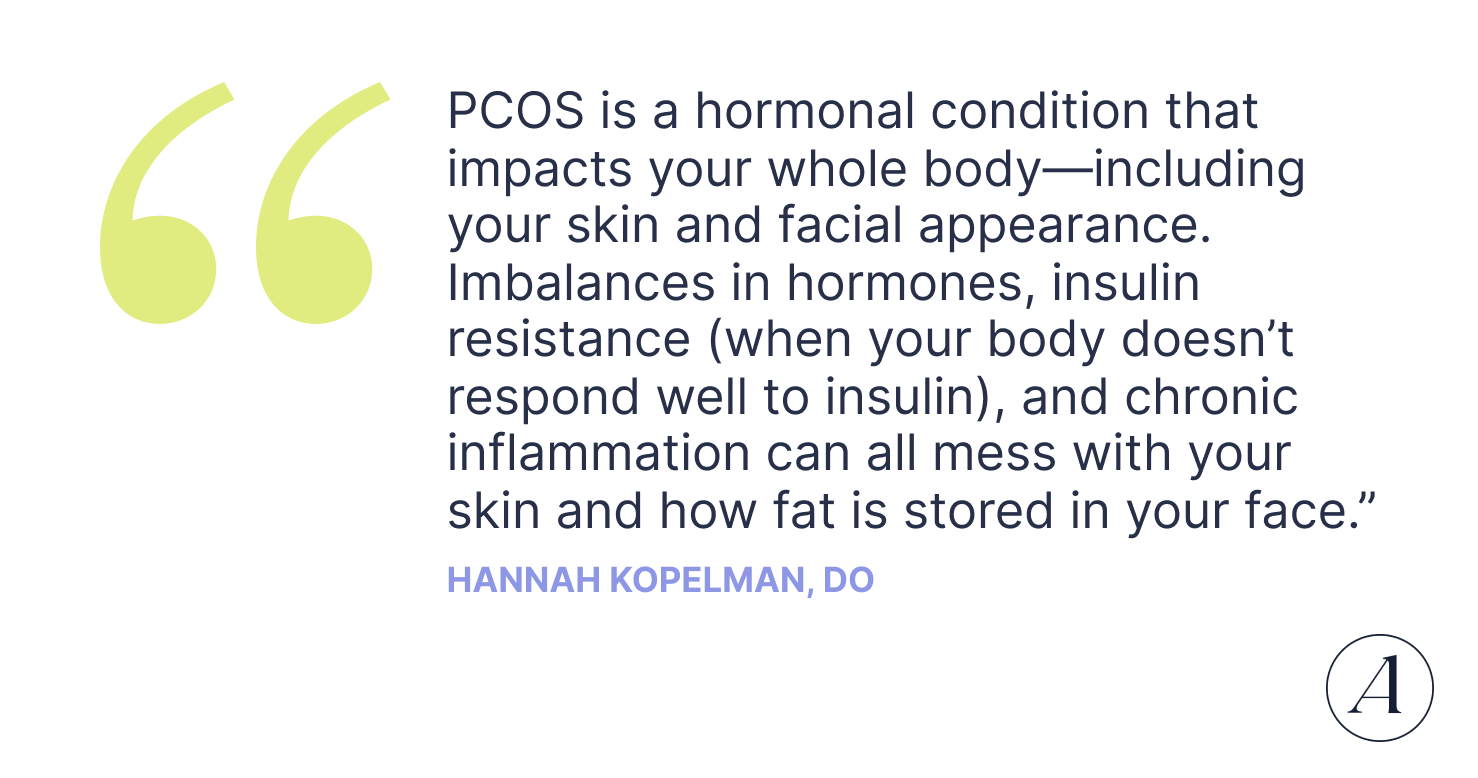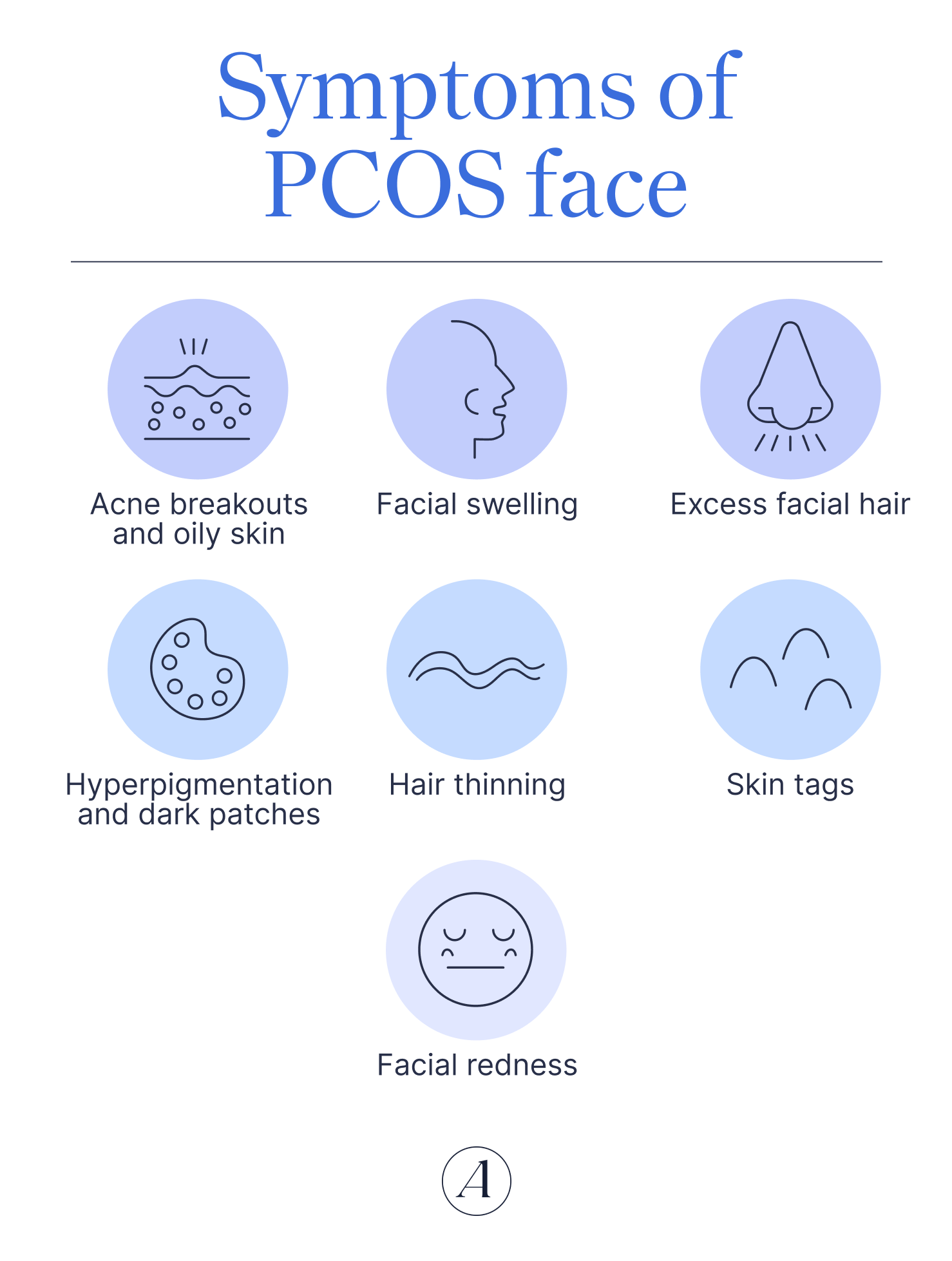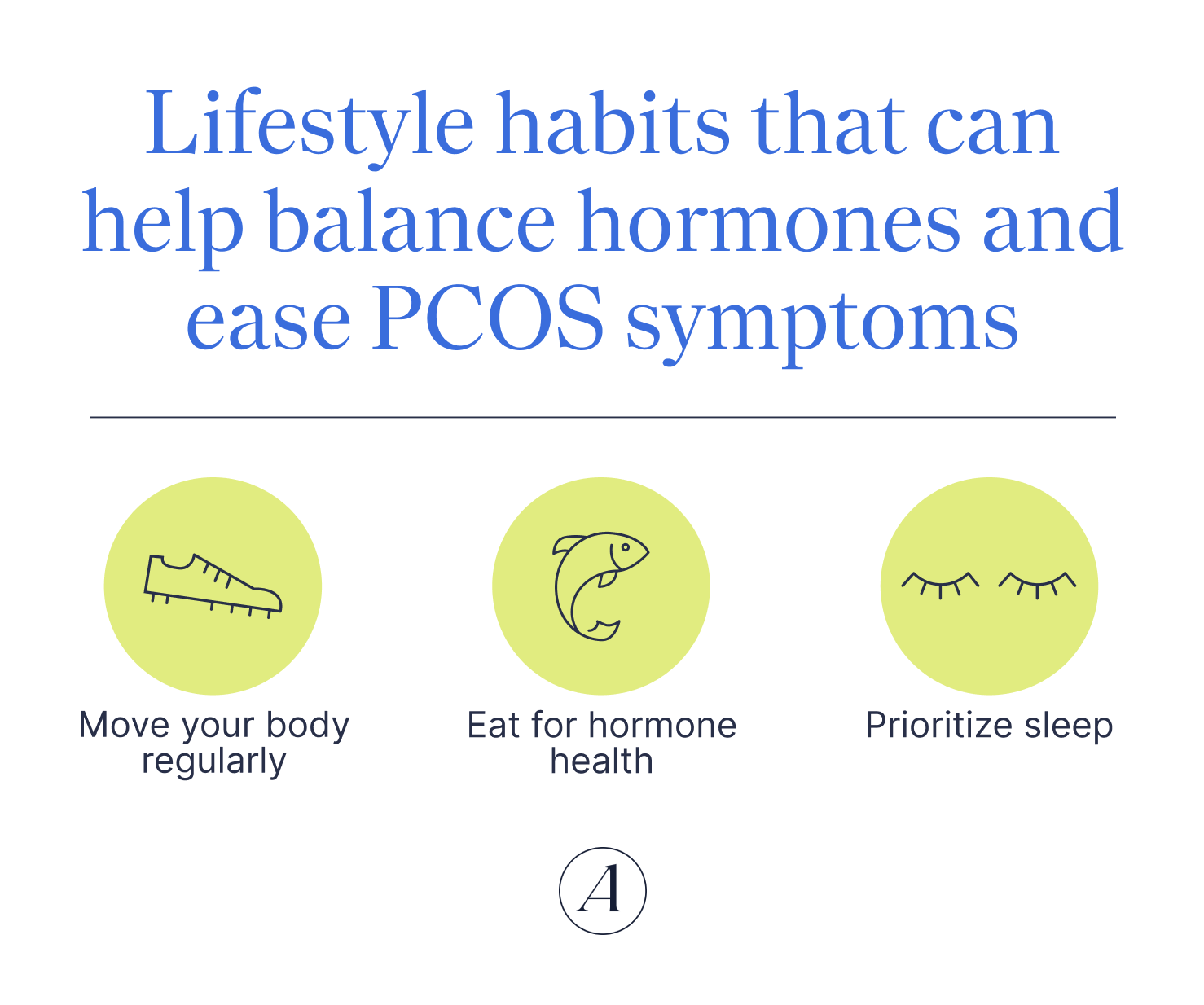
Treating PCOS Face: Skincare, Hormones, and Root Causes
Breaking out, puffing up, or spotting new facial hair? It might be PCOS face, and figuring out what’s really going on is the first step toward getting your skin (and hormones) back in sync.
If you've been dealing with sudden breakouts, puffiness, or stubborn facial hair and wondering what’s up, you might be experiencing PCOS face.
Polycystic ovary syndrome (PCOS) is the most common hormone disorder among women of reproductive age. And it’s not just about periods and fertility—it can impact your metabolism, cardiovascular health, and yes, your skin, especially on your face.
When your hormones are unbalanced, the symptoms don’t stay quiet—they often show up right on your face. While “PCOS face” isn’t an official diagnosis, it’s a very real experience for many people. In fact, more and more people are searching for answers around “PCOS face” because they’re seeing the signs written all over theirs.
I’ve been there—struggling with confusing skin changes tied to hormonal conditions like thyroid issues and perimenopause. It’s frustrating when your face is telling you something’s off, but you don’t have a name for it yet, let alone a treatment plan.
If you have acne that won’t quit, facial swelling, hyperpigmentation, facial hair in places you didn’t ask for, and other PCOS skin problems that just won’t budge with your usual skincare routine, you’re in the right place. This is your no-BS, medically reviewed guide to what causes PCOS face, how to treat it from the inside out, and how to finally start feeling (and looking) like yourself again.
What is PCOS face?

PCOS is a hormonal condition that impacts your whole body—including your skin and facial appearance. Imbalances in hormones, insulin resistance (when your body doesn’t respond well to insulin), and chronic inflammation can all mess with your skin and how fat is stored in your face, according to Hannah Kopelman, DO, a dermatologist at DermOnDemand.
This combo can trigger a range of symptoms, like acne, facial hair, hyperpigmentation, and puffiness, commonly referred to as PCOS facial features. It can even subtly change the contours of your face over time, contributing to what some call a PCOS face shape.

Symptoms of PCOS face
These telltale signs of PCOS appearance could be your body's way of waving a hormonal red flag.
- Acne breakouts and oily skin
- Facial swelling
- Excess facial hair
- Hyperpigmentation and dark patches
- Hair thinning
- Skin tags
- Facial redness
Oily skin and acne
Blame androgens, hormones like testosterone, for that extra shine (and not the good kind). In PCOS, higher androgen levels rev up your skin’s oil production, which can clog pores and trigger acne, according to Dr Kopelman. With PCOS hormonal acne, breakouts tend to show up along the jawline and lower cheeks (a typical PCOS acne pattern), she says.
Even if you don’t have PCOS, stress can spike androgen production too. No wonder your skin freaks out during high-pressure times.
Facial hair growth (hirsutism)
Those same extra androgens responsible for oily skin also stimulate unwanted hair growth on the face (think upper lip, chin, and jaw) in people with PCOS. This condition is called hirsutism and is associated with PCOS in about 75% of cases.
Here’s how it works: androgens transform fine “vellus” hairs into darker, coarser “terminal” hairs. That’s why men grow beards and why androgen excess in women can lead to similar growth in typically male-pattern areas.
Scalp hair loss
Ironically, while too many androgens can cause extra hair on your face, they can also lead to less hair on your head.
PCOS hair loss is caused by androgenetic alopecia (otherwise known as female pattern hair loss), which happens when too much DHT (a potent androgen) shrinks hair follicles on the scalp. This shrinkage causes hair to grow back finer and thinner until it stops growing altogether.
It’s a frustrating double whammy for folks with PCOS: more hair where you don’t want it, and less where you do.
Puffy or swollen face
Notice a rounder face, puffier cheeks, or even a subtle double chin? This could be a type of PCOS-related puffy face—also known as “moon face” thanks to the full moon shape. Hormonal imbalances and chronic inflammation can cause swelling (read: fluid retention) in the face, Dr. Kopelman says. These issues can even affect fat redistribution in the facial area.
Plus, that insulin resistance can be associated with weight gain, which often shows up in the cheeks, chin, and jawline. All these factors contribute to the characteristic PCOS moon face.
Dark patches
Dark, velvety patches on your neck, armpits, or groin might be acanthosis nigricans—a skin condition that affects 30-40% of people with PCOS (more than half, according to one study). Acanthosis nigricans can even show up on your face.
A core feature of PCOS, insulin resistance triggers a cascade that thickens and darkens the skin, Dr. Kopelman says. In acanthosis nigricans, high insulin levels can bind to growth receptors in the skin (specifically IGF-1 receptors on keratinocytes), ramping up cell growth and pigmentation, especially in folds and creases.
Skin tags
Those tiny, fleshy bumps on your eyelids, neck, or underarms—yep, they could also be linked to PCOS. In one study of 100 people with PCOS, 9% had skin tags.
Skin tags are harmless, but they’re more common in people with metabolic conditions like obesity and diabetes. Some research suggests that insulin resistance, which is often associated with obesity, diabetes, and PCOS, may play a role in the development of skin tags.
Facial redness and rash
Always look like you're blushing when you're not? Though it’s not a universal symptom, some people with PCOS experience facial redness. That’s because PCOS is linked to low-grade, chronic inflammation, which can make skin more sensitive, reactive, and slower to heal, Dr. Kopelman says.
Hormonal fluctuations can also boost blood flow to the face, intensifying that flushed look sometimes caused by a PCOS rash, says Dr. Kopelman. “In my experience, this redness can often flare around the time of hormonal changes in the menstrual cycle,” she adds.
“Some patients with PCOS may [also] experience facial redness due to … associated rosacea,” an inflammatory skin condition that causes facial flushing and visible blood vessels, says Dr. Kopelman. While there’s no hard research on hormones and rosacea, many people with rosacea report their flare-ups often worsen mid-cycle (or during menopause).
What causes PCOS face?
Spoiler: It’s not just stubborn skin—it’s hormones, inflammation, and more.
Elevated androgens
People with PCOS often have higher-than-normal levels of androgens—hormones like testosterone, DHEA, and dihydrotestosterone (DHT). Everyone has them, but men typically produce more. In women, too much androgen can throw things off.
This hormonal imbalance is a major driver of PCOS symptoms like oily skin, stubborn acne (especially along the jawline), and PCOS facial hair growth in areas like the chin or upper lip.
Insulin resistance
Insulin resistance is another critical piece of the PCOS puzzle. Many people with PCOS have insulin resistance, which leads to your body’s decreased ability to process glucose (or move glucose from the bloodstream into cells and tissues that need it for energy) properly.
High insulin levels not only mess with blood sugar, but they also stimulate the ovaries to produce more testosterone, making those symptoms (from PCOS skin darkening to moon face) worse.
High cortisol and stress
Feeling constantly stressed? That could be making your PCOS face worse.
Cortisol—your body’s main stress hormone—is released by the adrenal glands in response to physical or emotional stress. And research shows women with PCOS have higher normal levels of cortisol, found in both hair and saliva samples. Note that this does not necessarily mean that the problem is related to excess cortisol production like Cushing’s Syndrome.
Experts believe this may be due to overactivity of the HPA axis (a system in your brain and adrenal glands that manages stress and hormone production). When it’s in overdrive, it can disrupt hormone balance even further.
Stress can also increase androgen levels (those male hormones tied to acne, facial hair, and oily skin), while chronic cortisol overload has been linked to weight gain and shifts in body composition—both common in PCOS.
Inflammation
PCOS and inflammation often go hand in hand.
Studies show that people with PCOS tend to have low-grade chronic inflammation. In fact, inflammatory markers are consistently higher in PCOS patients.
This inflammation shows up on your skin. It can make your skin more reactive, slow down healing, and increase redness and sensitivity, says Dr. Kopelman. Even more concerning? Chronic inflammation is tied to other conditions like obesity, insulin resistance, and diabetes, all of which are closely linked with PCOS.
Poor sleep
Research shows that women with PCOS are more likely to deal with sleep disorders like obstructive sleep apnea, daytime sleepiness, and circadian rhythm problems. One study even found that PCOS patients had a delayed melatonin rhythm—meaning their bodies weren’t winding down at the right time—which was linked to higher testosterone levels and worse insulin sensitivity.
Long story short? Poor sleep throws off hormone regulation and can worsen insulin resistance, which is already a hallmark of PCOS. So prioritize those ZZZs.
How to get rid of PCOS face
If you're dealing with stubborn PCOS symptoms like acne, facial hair, or irregular periods, you’re not alone, and you’ve got options. From skincare to prescription treatments and lifestyle tweaks, here’s what might help.
Skincare
- Salicylic acid cleanser
- Niacinamide serum
- Non-comedogenic moisturizer
- SPF every day (especially with actives!)
- Prescription retinoids for acne
Hormonal Treatments
- Spironolactone to block androgens
- Birth control pills (in some cases)
- Talk to an endocrinologist or gynecologist for tailored options
Supplements and Herbs
- Myo-inositol for insulin sensitivity
- Zinc and omega-3s for inflammation
- Spearmint tea to lower testosterone
Anti-Inflammatory Diet
- Mediterranean-style meals
- High fiber, low sugar
- Lean proteins, legumes, healthy fats
- Skip ultra-processed foods
Skincare strategies
When it comes to managing PCOS face, there’s no magic fix. But the right skincare routine and PCOS acne treatment can seriously help. Here's how dermatologist Dr. Kopelman tackles it day-to-day.
Consistency is key. Focus on oil control, gentle exfoliation, and calming inflammation, says Dr. Kopelman. That might include:
- A salicylic acid cleanser to unclog pores
- A niacinamide serum to calm and balance skin
- A non-comedogenic (pore clogging) moisturizer to hydrate without causing breakouts
And don’t forget sun protection! It’s crucial, especially if you’re “treating pigmentation” related to PCOS skin discoloration or “using active ingredients like retinoids,” Dr. Kopelman says.
For more stubborn hormonal acne, you might need to level up with prescription treatments like topical retinoids, spironolactone, or oral meds from an endocrinologist, she adds.
Nutrition and supplements
What you put in your body matters just as much as what goes on your skin.
A healthy, anti-inflammatory diet can go a long way. One study found that a Mediterranean-inspired, low glycemic load diet—rich in legumes, fish, low-fat dairy, and fiber—improved weight, hormones, periods, blood pressure, and even markers of heart disease in people with PCOS.
Spearmint tea has also shown promise in lowering androgen levels, which can help clear up skin too, Dr. Kopelman says.
Additionally, supplements like myo-inositol, zinc, and omega-3s may improve insulin sensitivity and reduce inflammation—two root causes of PCOS skin symptoms, says Dr. Kopelman.
That said, always check with your healthcare provider before adding supplements, especially if you're on other medications or managing a health condition.
Medications and hormonal support
Sometimes your hormones need a little extra backup. These treatments may help manage the symptoms of PCOS face:
- Combined oral contraceptive pills can regulate periods, reduce excess androgens, and improve acne and unwanted hair growth.
- Anti-androgen medications block the effects of androgens, helping to reduce hair loss, facial hair, and breakouts. Just note: they’re not FDA-approved specifically for PCOS and aren’t safe during pregnancy.
- Insulin-sensitizing drugs (like metformin, often used for type 2 diabetes) can help improve insulin resistance, which in turn may reduce testosterone levels. Again, not FDA-approved for PCOS, but often used off-label for symptom relief.
- Targeted acne treatments include prescription creams, retinoids, or oral meds like spironolactone. If your acne is severe or hormonal, talk to a dermatologist or endocrinologist for tailored options.
- Hair removal options like facial hair creams, laser hair removal, or electrolysis can help manage visible symptoms like PCOS chin hair while you work on the root causes.
Lifestyle habits
You can’t cure PCOS with lifestyle alone, but healthy habits can help balance hormones and ease symptoms. Here’s what matters most:
Maintain a healthy weight (for you)
Even a 5% reduction in weight can improve insulin sensitivity and lower androgen levels, which may ease facial symptoms like acne or excess hair.
That said, some research shows many women with PCOS struggle to lose and keep off weight, even when trying multiple approaches. For some, lifestyle changes (like following an insulin-sensitive diet) can help. Others may benefit from medications such as GLP-1 receptor agonists, which are used to treat obesity and diabetes and may make weight loss more achievable.

Move your body regularly
Exercise helps with weight management and is also a powerful stress reliever—key for people with PCOS, since stress can spike androgen and cortisol levels.
Eat for hormone health
Focus on a balanced, nutrient-dense diet rich in fiber and omega-3s. Limit simple sugars, refined carbs, and processed fats to support insulin balance and reproductive function.
Prioritize sleep
Poor sleep can throw off your hormones and worsen PCOS face symptoms. Here’s how to get better shut-eye:
- Stick to a schedule – Aim for 7+ hours a night and try to wake up/go to bed at the same time every day (even on weekends).
- Unplug an hour before bed – Ditch screens and go analog: read a book, take a bath, or listen to calming music.
- Cut the stimulants – Avoid caffeine 5 hours before bed and skip alcohol within 4 hours of sleep—it messes with your sleep quality.
- Lighten your dinner – Don’t eat heavy meals 2–3 hours before bed, and skip spicy or fatty foods that can disrupt digestion.
- Keep workouts earlier – Intense evening workouts can keep your brain wired. Try to move earlier in the day if possible.
When to see a specialist
PCOS face isn’t just about breakouts or unwanted hair—it’s your body waving a hormonal red flag. These facial symptoms often point to deeper issues like insulin resistance or hormone imbalances, which can raise your risk for serious conditions like type 2 diabetes.
If you’re fed up with the symptoms, it’s time to get to the root of the problem. A healthcare provider who truly understands PCOS can help you figure out what’s going on beneath the surface and create a treatment plan that actually works for you.
Not sure where to start? The experts at Allara can diagnose, treat, and support you from the comfort of your home, so you can finally feel in sync with your body again.
The bottom line
PCOS face can feel frustrating, but it’s not just skin deep—it’s a clue from your body that something’s off hormonally. The good news? With the right mix of skincare, lifestyle tweaks, and expert support, clearer skin and hormonal balance are totally within reach.
Ready to take control of your symptoms and feel more like yourself? Allara’s care team is here to help you get answers, build a personalized plan, and finally start feeling better—from the inside out.
Key takeaways
- PCOS face is real. Acne, oiliness, facial hair, pigmentation, and puffiness are all common symptoms driven by hormonal imbalances.
- Clear skin starts from within. Balancing blood sugar, reducing inflammation, and supporting hormones through food, supplements, and medication can help.
- Skincare matters. Think gentle exfoliation, oil control, and sun protection. Prescription treatments may be needed for stubborn breakouts.
- Facial hair and hair loss can improve. With consistent treatment and hormonal support, symptoms like hirsutism and thinning hair can be managed.
- You don’t have to figure it out alone. The right provider can help you get answers and create a personalized plan that actually works.
Frequently Asked Questions (FAQs)
How does PCOS affect the face?
PCOS messes with your hormones—especially androgens—and your skin pays the price. The result? Oily skin, stubborn acne (hello, jawline breakouts), dark spots, and sometimes even facial hair. Basically, it’s like puberty 2.0, but without the prom.
How to get rid of PCOS moon face?
In PCOS, “moon face” is often tied to weight gain or inflammation. The fix? A combo of anti-inflammatory foods, regular movement, and blood sugar balance. A Mediterranean-style diet packed with fiber, healthy fats, and lean protein can help reduce puffiness and support hormones naturally. Certain medications that reduce androgens and improve insulin sensitivity can also be a huge help.
Does PCOS make your face break out?
Yep—hormonal breakouts are one of the most common skin symptoms of PCOS. Elevated androgens boost oil production, which clogs pores and leads to acne, especially around the chin and jawline. A solid skincare routine with salicylic acid, niacinamide, and possibly prescription treatments can help get things under control.
Does PCOS facial hair go away?
Facial hair from PCOS—think chin, upper lip, or sideburn fuzz—is caused by those pesky androgens. It usually won’t disappear on its own, but it can be reduced with treatments (like spironolactone) and hair removal options like laser or electrolysis. Lifestyle changes that improve insulin resistance can also help long-term.
Does PCOS cause hair loss?
Unfortunately, yes. While some hairs grow where you don’t want them, others fall out where you do. Androgens can shrink hair follicles, leading to thinning at the crown or temples (aka PCOS-related hair loss). Managing hormone levels with meds, a balanced diet, and anti-inflammatory supplements may help slow the shedding.













